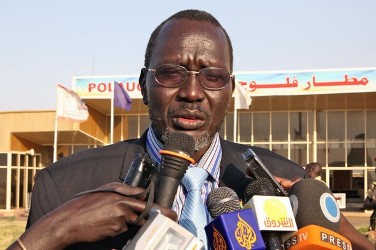South Sudan develops strategy to improve financial management systems
January 25, 2017 (JUBA) – South Sudan is developing a financial management strategy to improve revenues collection as it hopes to diversify its oil dependent economy, officials said.

As such, UNDP hopes that this improved tax revenue system will allow the Government of South Sudan to effectively manage the funds at all levels, and use the revenue to expand services to the public, such as funding education, health, and other urgent social services.
Already, the Jubek State Minister of Finance, John Ijino Lako has welcomed the partnership and support government received from UNDP, working in collaboration with partners to develop the strategy.
Lako said he remains optimistic about the improved tax revenue collection system.
“If the economy improves we will have industries, investors will come to South Sudan and people will be busy. They will have jobs, incomes, and they will be able to participate in activities. They will have the freedom and opportunities to go to school, have access to health care and able to develop their own businesses. Nobody will want to fight and war will be over,” said Lako during Tuesday’s launch of the plan.
South Sudan, he said, is a potentially rich country, although majority of the working population is engaged in subsistence agriculture and livestock rearing, the oil sector remains the main economic driver.
The Nile River, for instance, is one of its major natural features in the country, but remains largely untapped as an economic resource.
According to the finance minister, in 2016, UNDP experts in public financial management supported the development of a unified tax schedule, standardized training manual on non-oil revenue administration and trained 74 members of the state legislative assemblies from Yei River, Jebek, Aweil and Gbudwe on budget execution, monitoring, expenditure and value for public funds.
The Undersecretary for Planning at the Ministry of Finance, Wani Buyu Dyori, however, painted his own vision for the improved non-oil revenue management.
“With resources, states will be able to open roads which will improve access to rural areas and therefore the livelihoods of rural people. We will grow food and return to fishing, as we have from the Nile in previous times”, remarked Dyori.
The oil sector, which accounts for over 90% of government revenues, has been badly affected the recent war, in addition to the decline in oil prices on world markets
The conflict, which broke out in 2013, has negatively impacted on the nation’s citizens, including pushing the country to the brink of famine with 5.8 million people, nearly half of the population, in desperate need of humanitarian assistance, a joint U.N assessment report recently-showed.
Observers say despite being oil-rich, South Sudan is likely to record negative gross domestic product growth in 2016 after growing by 30.7 percent two years ago, largely due its conflict, decline in oil production and global fall in oil prices.
(ST)
